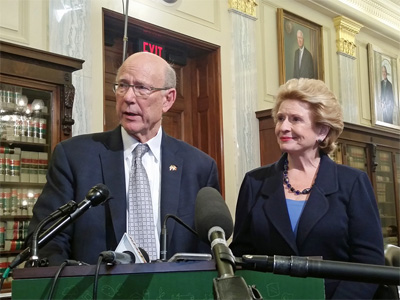 When Congress passed the Farm Bill of 2014, it included Sec. 7606 authorizing state regulated research pilot programs with hemp. That program has been a huge success growing to include over 3,500 licensed participants who planted more than 77,000 acres in 2018. At the same time, the U.S. market for hemp products has grown to more than $800 million as of 2017. However, hemp pilot program regulations are burdensome and are made even more challenging by heavy handed Drug Enforcement Administration oversight. Vote Hemp, along with thousands of businesses and advocates, have been pushing for commercial hemp farming legislation and removal of roadblocks to the growth of the U.S. hemp industry.
When Congress passed the Farm Bill of 2014, it included Sec. 7606 authorizing state regulated research pilot programs with hemp. That program has been a huge success growing to include over 3,500 licensed participants who planted more than 77,000 acres in 2018. At the same time, the U.S. market for hemp products has grown to more than $800 million as of 2017. However, hemp pilot program regulations are burdensome and are made even more challenging by heavy handed Drug Enforcement Administration oversight. Vote Hemp, along with thousands of businesses and advocates, have been pushing for commercial hemp farming legislation and removal of roadblocks to the growth of the U.S. hemp industry.
Congress has been negotiating a new Farm Bill and is once again considering federal policy regarding hemp thanks to leadership from Senator McConnell (R-KY) and Senator Wyden (D-OR). The House and Senate each passed their versions of the bill and the Senate version included language from the Hemp Farming Act of 2018 that removes hemp from the Controlled Substances Act and allows farmers to grow hemp commercially under a state or federal license.
What will the new Farm Bill hemp law do?
- Define industrial hemp broadly to cover all parts of the Cannabis plant including seeds, derivatives, extracts, cannabinoids etc as long as it has a THC level of 0.3% or less
- Remove hemp completely from the Controlled Substances Act (CSA)
- Make USDA the sole federal regulatory agency overseeing hemp cultivation
- Include native American tribes which were not explicitly included in Sec. 7606 of the 2014 Farm Bill
- Authorize and fund hemp research as part of the Supplemental and Alternative Crops program and the Critical Agricultural Materials Act
- Authorize federal crop insurance for hemp
- Require USDA to develop federal regulations for hemp farming that may be used in states that choose not to be the primary regulator
- Require states wishing to have primary regulatory authority to submit a plan for regulation to USDA that meets minimum requirements
- Repeals Sec. 7606 hemp research program 1 year after USDA establishes federal regulations for hemp farming
- Require USDA to conduct a study of state hemp agricultural pilot programs
If the Farm Bill is signed into law before the end of 2018, it will go into effect beginning on January 1, 2019. However, it will take time for the new law to be implemented. In states where hemp is legal, state departments of agriculture will need to submit regulatory plans to USDA for approval. Section 7606 does not expire until 1 year after the USDA creates optional regulations for states that choose not to develop programs. This means existing state programs are still valid. However, we urge states to move promptly to create and submit new state regulations to USDA once the Farm Bill is signed into law.
There are a few minimum requirements that a state plan must have:
- a practice to maintain relevant information regarding land on which hemp is produced, including a legal description of the land
- a procedure for testing the crop
- a procedure for conducting annual inspection (limited to one per year)
- a procedure for the effective disposal of products that are produced in violation
- a procedure to comply with the enforcement procedures
- a certification that the State or Indian tribe has the resources and personnel to carry out the requirements
The USDA will have 60 days to respond with an approval or a reason why the proposed plan doesn’t meet the minimum requirements. If denied, a state can revise and resubmit their plan.
What about hemp extracts containing CBD?
The Farm Bill removes hemp completely from the CSA. It makes is 100% clear that cannabinoids are included so hemp derived CBD will not be a controlled substance. The bill does not change requirements of the Federal Food, Drug, and Cosmetic Act so producers are still subject to FDA regulations. The FDA has stated in an FAQ that it is their current opinion that CBD may not be sold as a dietary supplement but they have not said that whole plant hemp extracts are covered. Their logic is that a previous application for the drug Epidiolex prohibits the sale of the same substance as a dietary supplement. But Epidiolex is pure CBD and is not the same as a whole plant hemp extract. The industry does not agree with FDAs stance on CBD and there will likely be further developments on this.